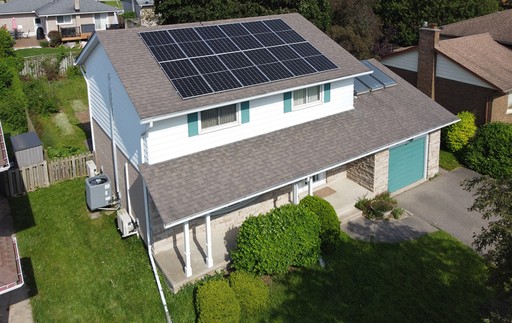Back to Index
Agricultural Solar Systems
Agricultural Solar Systems
A comprehensive look into what you can expect when installing an agricultural solar array.
What do you need to consider before choosing a solar company for the farm?
As of October 01, 2024 farms can claim several federal incentives if they are registered as Canadian Corporations, such as the Clean Technology Investment Tax Credit (CTITC) which offers a 30% refundable tax credit, and/or the Accelerated Investment Incentive (AII) which offers a capital cost allowance for the solar system cost in the first year.
There are also incentives and financing programs available through Farm Credit Canada (FCC), a Canadian Crown corporation that offers agricultural lending services as well as grants and other business services to various types of agricultural suppliers across the country.
Solar power is an excellent solution for farms with high energy demands. Here’s what you should consider when choosing a solar provider for your farm:
Experience with Agricultural Systems:
Farms have unique energy needs, so it’s essential to choose a provider that understands the specific requirements of agricultural operations.
Ground Mount vs. Roof Mounting Panels:
With ample space, farms often have options for both roof and ground mounted systems. Large barns are typically the most economical option for panel placement, but a south facing ground mount may allow you to maximize energy production.
Local Incentives:
Agricultural solar systems often qualify for special rebates and incentives, so make sure your provider is knowledgeable about these programs.
Energy Independence:
Solar energy can reduce reliance on the grid and provide consistent power for essential farm operations, especially in remote or rural areas.
Choosing the right solar provider ensures your farm receives a custom solution that meets your energy needs efficiently and sustainably.
On larger solar projects, Guelph Solar will help manage the more thorough approval by the hydro company that involves:
1. Needs Assessment and Initial System Design (2-3 weeks)
2. Engineered System Design (2-3 weeks)
3. Navigating the Hydro Connection Impact Assessment (8-16 weeks)
4. Connection Cost and Distribution Connection Agreements (variable)
5. Equipment Procurement (2-4 weeks subject to equipment availability)
6. Installation and Testing Phase (depends on system size and complexity)
7. Commissioning and Final Approvals (4 weeks)
Typical timeline: 1 - 1.5 years
What do you need to consider before choosing a solar company for the farm?
As of October 01, 2024 farms can claim several federal incentives if they are registered as Canadian Corporations, such as the Clean Technology Investment Tax Credit (CTITC) which offers a 30% refundable tax credit, and/or the Accelerated Investment Incentive (AII) which offers a capital cost allowance for the solar system cost in the first year.
There are also incentives and financing programs available through Farm Credit Canada (FCC), a Canadian Crown corporation that offers agricultural lending services as well as grants and other business services to various types of agricultural suppliers across the country.
Solar power is an excellent solution for farms with high energy demands. Here’s what you should consider when choosing a solar provider for your farm:
Experience with Agricultural Systems:
Farms have unique energy needs, so it’s essential to choose a provider that understands the specific requirements of agricultural operations.
Ground Mount vs. Roof Mounting Panels:
With ample space, farms often have options for both roof and ground mounted systems. Large barns are typically the most economical option for panel placement, but a south facing ground mount may allow you to maximize energy production.
Local Incentives:
Agricultural solar systems often qualify for special rebates and incentives, so make sure your provider is knowledgeable about these programs.
Energy Independence:
Solar energy can reduce reliance on the grid and provide consistent power for essential farm operations, especially in remote or rural areas.
Choosing the right solar provider ensures your farm receives a custom solution that meets your energy needs efficiently and sustainably.
On larger solar projects, Guelph Solar will help manage the more thorough approval by the hydro company that involves:
1. Needs Assessment and Initial System Design (2-3 weeks)
2. Engineered System Design (2-3 weeks)
3. Navigating the Hydro Connection Impact Assessment (8-16 weeks)
4. Connection Cost and Distribution Connection Agreements (variable)
5. Equipment Procurement (2-4 weeks subject to equipment availability)
6. Installation and Testing Phase (depends on system size and complexity)
7. Commissioning and Final Approvals (4 weeks)
Typical timeline: 1 - 1.5 years
Planning a Rooftop install?
Click here for the Ontario fact sheet for rural solar rooftop installations.
Solar 101: Everything you Need to Know
Solar 101: Everything you Need to Know

Residential Systems
What components are needed for a residential system?

Net Metering
Learn how net metering works and how it can save up to 90% from your energy bill.

Maintenance
Service
What level of service or maintenance is required with solar installations?

Environmental Impact
Ecological Impact
What is the impact of solar panels on the environment.

Commercial Systems
What to expect when installing a commercial system.

Agricultural Systems
What do you need to consider before choosing a solar company for the farm?

Battery Backup
Should I get a solar battery for my home? Decide if the battery option is right for you.

Frequently Asked Questions
The most frequently asked questions you may not have thought of yet.
© 2025 All Right Reserved by Guelph Solar
Guelph Solar Supported Links
© 2025 All Right Reserved by Guelph Solar
Guelph Solar Supported Links
© 2025 All Right Reserved by Guelph Solar
Guelph Solar Supported Links

